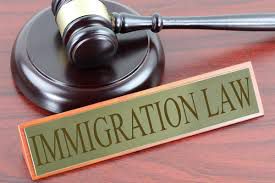I am interested in applying for U.S. citizenship.
You may be eligible to apply for U.S. citizenship if you have been a Permanent Resident for three years, if you obtained your residence through marriage to a U.S. citizen, or five years, if you obtained your residence through any other means. For in-depth information on the naturalization process, including application forms, instructions, and fee information, please visit: https://www.uscis.gov/us-citizenship
To study for your naturalization test, you can find a study guide app and practice tests at https://my.uscis.gov/prep/test/civics.
If you were born abroad but your parent(s) were/are U.S. citizens, you may already be a U.S. citizen through “acquisition” or “derivation.” For more information, you may visit https://www.uscis.gov/us-citizenship/citizenship-through-parents.
I am a U.S. citizen on permanent resident and would like for my close family member or fiance to join me in the Unites States.
I would like to study in the United States
USA.gov is the U.S. government’s central information hub for international students who wish to study in the United States. For more information, please visit https://www.usa.gov/study-in-US.
You can also visit https://studyinthestates.dhs.gov/school-search to find a school qualified to accept international students.
I am in removal (deportation) proceedings
If you are in removal proceedings, special remedies/defenses may be available to you, in addition to these remedies. For more information on these remedies, please see the following section, “Immigration Court (Removal Proceedings) and Detention.”
I would like to work in the United States
There are two primary types of work visas: temporary (non-immigrant) and permanent (immigrant). There are also employment visas available for workers from certain countries with which the United States has a treaty relationship.
For more information on temporary and treaty-based work visas, please visit the U.S. Department of State’s pages on
o Temporary worker visas: https://travel.state.gov/content/travel/en/us-visas/employment/temporary-worker-visas.html
o Treaty Trader/Investor visas: https://travel.state.gov/content/travel/en/us-visas/employment/treaty-trader-investor-visa-e.html
o Canadian and Mexican NAFTA Professional Workers: https://travel.state.gov/content/travel/en/us-visas/employment/visas-canadian-mexican-nafta-professional-workers.html
For more information on permanent work visas (employment-based green cards), you may visit the U.S. Citizenship and Immigration Services: https://www.uscis.gov/green-card/employment-based
I am a child who has suffered abuse, neglect, or abandonment by one or both of my parents
You may be eligible for Special Immigrant Juvenile Status. For more information, please visit U.S. Citizenship and Immigration Services page on Special Immigrant Juveniles: https://www.uscis.gov/green-card/sij
Kids in Need of Defense (KIND) is a nationwide legal services/advocacy organization that provides assistance and information to immigrant children in need. They have published a manual on Special Immigrant Juvenile Status, which you may access at https://supportkind.org/wp-content/uploads/2015/04/Chapter-4-Special-Immigrant-Juvenile-Status-SIJS.pdf. For more information on KIND and their services, please visit their website at https://supportkind.org/
I am afraid to return to my home country.
I am afraid to return to my home country
If you believe you have suffered human trafficking, there are resources available to you. You should contact local law enforcement and/or the human trafficking hotline for help at 1-888-373-7888 (https://humantraffickinghotline.org/). The hotline has interpreters to assist in over 200 languages.
A special visa, the T visa, is also available for certain survivors of severe forms of human trafficking. For more information on the T visa, please visit the U.S. Citizenship and Immigration Services (USCIS): https://www.uscis.gov/humanitarian/victims-human-trafficking-other-crimes/victims-human-trafficking-t-nonimmigrant-status
I am the victim of a crime (including domestic violence/abuse) in the United States.
If you are in a dangerous situation, you may contact local law enforcement by calling 911. For domestic violence resources such as shelters, you may also contact the National Domestic Violence Hotline at 1−800−799−7233 or TTY 1−800−787−3224.
If you are a non-citizen who has suffered a crime in the United States, certain immigration protections may be available to you, depending on the circumstances of the crime.
These include:
-
U visa for non-citizen crime victims:
-
USCIS, U visa information page:
-
Immigrant Legal Resource Center, “Getting a U visa: Pro Se Manual”:
https://www.ilrc.org/sites/default/files/resources/proseuvisamanual_english.pdf
-
WomensLaw.org, “U visa for crime victims”: https://www.womenslaw.org/laws/federal/immigration/u-visa-crime-victims
Special additional protections for domestic violence victims:
These include:
-
Self-petitions for legal status under the Violence Against Women Act (VAWA)
• USCIS VAWA overview: https://www.uscis.gov/humanitarian/battered-spouse-children-parents
• WomensLaw.org, “VAWA for abuse victims”: https://www.womenslaw.org/laws/federal/immigration/vawa-abuse-victims
-
Cancellation of removal under VAWA (if you are in removal proceedings) (see links above)
-
U-nonimmigrant status (crime victims) (see links above)

